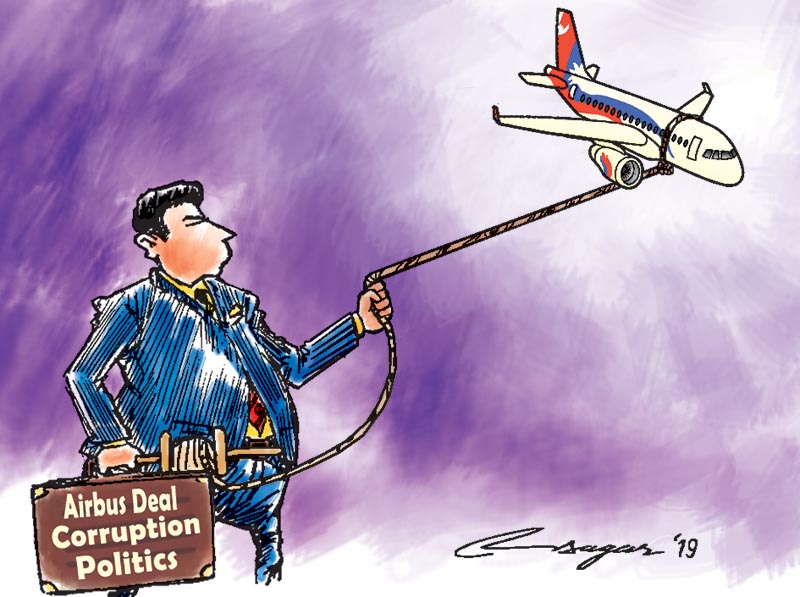NAC: From heyday to mayday
Nepal Airlines Corporation is on the verge of being a national burden from national pride. However, we still can protect its glory if we act promptly and properly
In the last few weeks, much ink has been spilt over the controversies invited by the purchase of two Airbus A330-200, after the Public Accounts Committee of the House of Representatives concluded the said deal has cost Nepal Airlines Corporation (NAC) a loss of Rs 4.35 billion, and held 34 incumbent and erstwhile government officials responsible for it. However, no attention has been given yet to the fate of our national flag carrier, the financial status of which is now steadily heading towards a crash.
The NAC, being the oldest airline of the country, once ruled the skies of Nepal and beyond as a monopoly aviation business. It spanned its wings in five European cities – Amsterdam, Frankfurt, Paris, London and Vienna – apart from Shanghai, Osaka, Singapore, Dhaka, Karachi and Indian cities like Patna and Kolkata besides the sectors it currently flies to. Gradually, new airlines started offering good marketing strategies and services to Nepalese passengers, as the government liberally allowed foreign carriers to expand operations in the Nepalese sky. However, because of NAC’s sabai thick cha (‘all is well’) attitude, along with the mismanagement and corruption, it not only started losing its passengers and monies but also its credentials. Economy pundits attribute competition as a key to productivity; however, even the competitive market didn’t encourage NAC to enhance productivity. Many consider NAC never had fair competition, as it was always crippled by politics, mismanagement and corruption, however, the author only partly subscribes to this view.
This author has always regarded NAC as a source of national pride rather than merely a corporation. For many Nepalis, the addition of the two Airbus A330-200 in the NAC’s fleet was a historic move, which was supposed to be followed by the addition of new aircraft. Expansion of NAC’s fleet is a must as within the next few years we will probably have three new international airports – Gautam Buddha International Airport, Pokhara International Airport and Nijgadh International Airport – with an ambitious dream to make Nepal one of the busiest air hubs in Asia, coupled with the announcement of Visit Nepal 2020, with an aim of welcoming two million foreign tourists. Unfortunately, the purchase of the two A330-200s is now shrouded in controversy. The fact that Nepalese private airlines companies are working hard to operate international flights from the Tribhuvan International Airport and regional international airport shows how lucrative the Nepalese sky is, however, NAC is always making mayday calls.
Even on the domestic front, NAC’s status is too critical. Today, NAC lacks proper fleet and manpower to raise its glory. In addition, NAC’s domestic flights are notorious for frequent flight delays and cancellations, and many consider flying in NAC a symbol of low standard.
There are various explanations regarding the descent of such a decent airline, such as mismanagement, political interference, dubious aircraft deals, corruptions and the list goes on. NAC did observe a lot of plans to enhance its service and market, however, those plans were either inefficient or ignored or engulfed by mismanagement, corruption and politics. Apparently, everyone seems to enjoy the benefits out of NAC first, and pay the blame game to be oneself safe later. Yet, very few are concerned about pulling the NAC out of the steep nose-dive towards debt traps. This very debt trap is not only hazardous to the NAC, but also to the government, as the government should inject more from the taxpayers’ money to balance the corporation’s high debt-to-equity ratio.
Notwithstanding all these pessimistic notes, there still are rays of hopes. First of all, NAC should be operated as an independent public company rather than yet another public corporation, which is largely interfered and funded by government. Converting NAC into a business-oriented public company, with majority of the shares secured with the government, could be a viable option. The current government is focussed on achieving socialism goals, and also focussed on the implementing an economic policy with meaningful participation of the private sector. This very effort could be beneficial to government in achieving its socialism goals.
However, the author is cynical about the possibilities of luring the public to purchase the shares of NAC. As even after attaining public company status, NAC will have burdens to heal its old scars, especially in matters of public perception. By analysing the current fleet capacity, NAC should expand its routes to lucrative destinations, primarily to the Gulf countries, Japan, Korea and Indian cities, given the large movement of passengers on these routes for employment, education, tourism and business purpose. NAC should also get proactive to have codeshare flights with major airlines, as it merely has a codeshare agreement with Druk Air, which has very limited fleet like the NAC. Due to limited manpower and expertise in the aviation sector, NAC should also consider out-sourcing technical and management experts and/or have a strategic partner to reform the airlines. Furthermore, NAC should also adopt an effective marketing and branding strategy.
NAC is on the verge of being a national burden from national pride. However, we still can protect its glory if we act promptly and properly.
Chhetri is a lawyer






